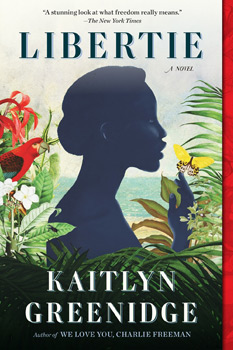Summary | Excerpt | Reading Guide | Discuss | Reviews | Beyond the book | Read-Alikes | Genres & Themes | Author Bio

Kaitlyn Greenidge burst onto the literary scene in 2016 with her award-winning novel, We Love You, Charlie Freeman. This brilliant debut wove together an intimate story of family relationships with a larger narrative about the interplay of race, history and language. Now, Greenidge has followed up with an equally ambitious and no less compelling historical narrative that explores both family dynamics and the history of race in the Americas.
Libertie has always known, on some level, that she is participating in history. She is the daughter of Cathy Sampson, a Black woman practicing medicine during and after the Civil War in a community of free Blacks in Brooklyn. Dr. Sampson often uses her expertise to heal the physical scars of those who have escaped slavery (sadly, their mental scars are far more difficult to remedy). After the war, Dr. Sampson helps found a hospital for women, focusing on maternal care and reproductive education.
Throughout, Libertie is at her side, following her mother's example, learning from her, and believing in her dream: "[Y]ou and I will have a horse and carriage together, with 'Dr. Sampson and Daughter' written in gold on the side." But she is also increasingly aware that her physical presence might be at odds with that aspiration. Unlike Dr. Sampson, Libertie has very dark skin, and she comes to realize that her mother's patients make assumptions about her based on her skin color, and worse, that her mother seems to treat her differently out of deference to their colorist biases.
After a brief but disastrous sojourn to a medical program at an Ohio college — where she gains the loyal friendship of two other young women — Libertie returns home to her mother's practice. Too ashamed to admit her academic failings, she rushes into marriage with Emmanuel, Dr. Sampson's latest apprentice. Emmanuel is the son of an Episcopal bishop in Haiti, and he and his father share a vision of the island nation as a new frontier for Black people who have grown disillusioned with the limited prospects of life in the United States after the Civil War. Libertie, whose deceased father named her after his own visions of an African homeland for American Blacks in Liberia, grows excited about perhaps playing a role in this new chapter of history. But what she discovers in Haiti is a very different reality, involving animosity, dark family secrets, and, perhaps, the will to reconcile issues from her own past.
In her debut novel, Greenidge demonstrated her skillful storytelling powers, which are also clearly on display here. Libertie is at once a very individual chronicle of the changing, sometimes contentious relationship between a mother and a daughter with competing ambitions, and an exploration of much broader issues. These include the phenomenon of colorism, both within the African American community and more broadly, as well as the vigorous post-Emancipation philosophical debates about the best course forward for newly freed Black people and whether there was any prospect of true "liberty" on American shores.
These issues will certainly resonate with readers, but I suspect what will stay with them most are the impassioned words and sentiments between Cathy and Libertie, the mother and daughter who don't always see eye to eye but who clearly need one another. "The only good poem I've ever written is you," Dr. Sampson says, "A daughter is a poem. A daughter is a kind of psalm. You, in the world, responding to me, is the song I made. I cannot make another." In Libertie, Kaitlyn Greenidge paints a vivid portrait of a particular family at a particularly fraught time in history, the broad strokes of which are utterly timeless.
![]() This review was originally published in The BookBrowse Review in April 2021, and has been updated for the
March 2022 edition.
Click here to go to this issue.
This review was originally published in The BookBrowse Review in April 2021, and has been updated for the
March 2022 edition.
Click here to go to this issue.

If you liked Libertie, try these:

by Nicola Yoon
Published 2025
Thrilling with insightful social commentary, One of Our Kind explores the ways in which freedom is complicated by the presumptions we make about ourselves and each other.

by Dolen Perkins-Valdez
Published 2025
A woman learns the incredible story of a real-life American Kingdom—and her family's ties to it—in this enthralling novel from the New York Times bestselling, NAACP Image Award-winning author of Take My Hand.
Discovery consists of seeing what everybody has seen and thinking what nobody has thought.
Click Here to find out who said this, as well as discovering other famous literary quotes!
Your guide toexceptional books
BookBrowse seeks out and recommends the best in contemporary fiction and nonfiction—books that not only engage and entertain but also deepen our understanding of ourselves and the world around us.